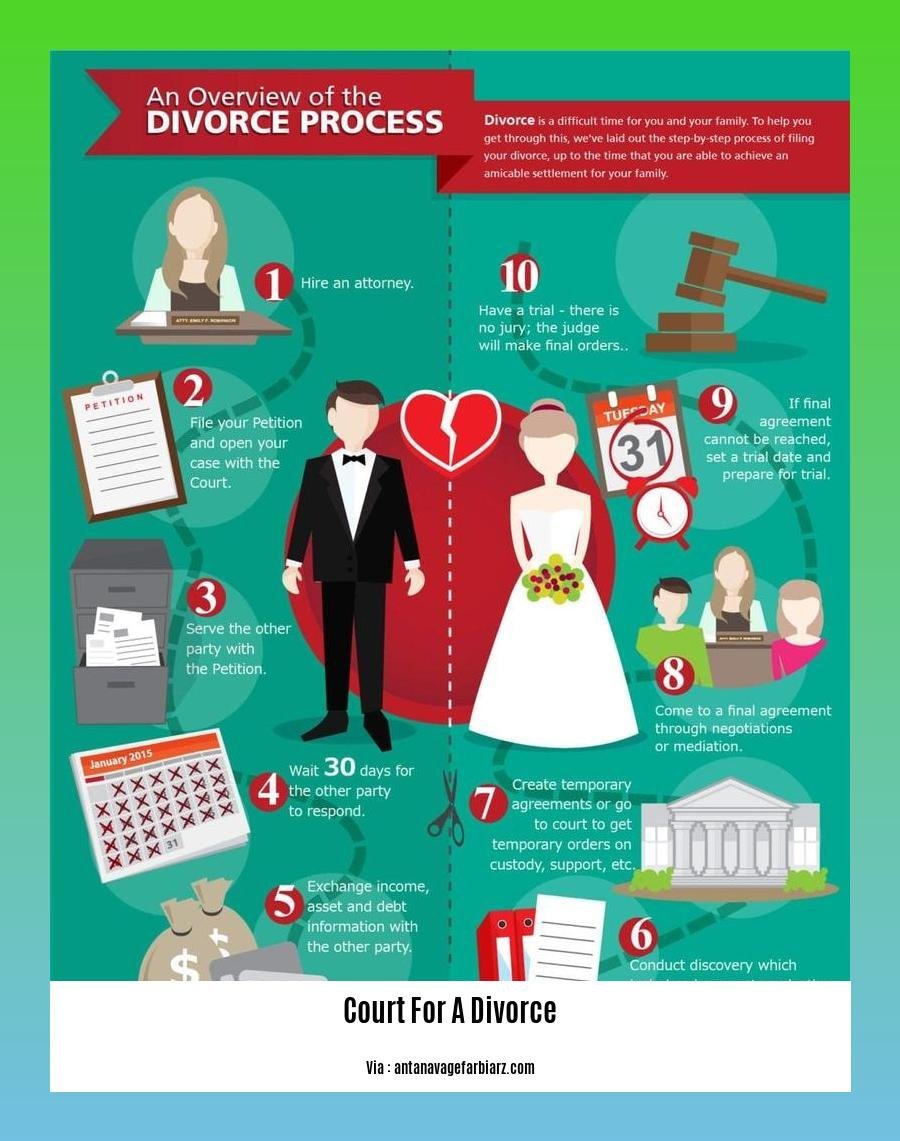Do you find yourself wondering whether you need to go to court for a divorce? Understanding the circumstances surrounding divorce proceedings can be a daunting task. However, this comprehensive article aims to shed light on this issue and provide you with the clarity you need. As an experienced family law attorney with a strong background in divorce proceedings, I have helped numerous clients navigate the complexities of the legal process. With the knowledge gained through years of practice, I will guide you in understanding the specific circumstances under which attending court might be necessary for your divorce.
Key Takeaways:
- Whether or not you have to go to court for a divorce depends on the type of divorce you are seeking and the state laws.
- An uncontested divorce typically does not require a court appearance and can save time and money.
- However, if spouses cannot agree on critical issues such as asset division, debt division, or alimony, a court appearance is usually necessary.
- Finalizing the divorce through an uncontested process is ideal if you have minor children, as it prevents them from witnessing the tension in custody and child support proceedings.
- State laws regarding uncontested divorces vary, so it is important to consult the specific laws of your state.
- It is crucial to show up to all required appointments and court hearings; failure to appear may result in a default divorce.
- Divorce without a trial is possible if both parties agree on the terms, and the judge typically reviews and approves the legal documents.
- Consulting an attorney to understand the specific requirements of your jurisdiction is advisable.
Do You Have to Go to Court for a Divorce? Understanding the Circumstances

Divorce can be a distressing and emotionally challenging process. Many couples wonder whether they will have to go through the inconvenience and stress of a court appearance to finalize their divorce. The answer to whether you have to go to court for a divorce depends on various factors, including the type of divorce you are seeking and the laws in your state. Here’s a comprehensive guide to help you understand the circumstances under which attending court might be necessary for your divorce.
Uncontested Divorce: The Route to Avoid Court
In certain situations, an uncontested divorce provides a smoother and less contentious path to legally end a marriage, without the need for a courtroom drama. An uncontested divorce occurs when both spouses come to a mutual agreement on key issues such as asset division, debt allocation, alimony, child custody, and child support.
The advantage of an uncontested divorce is that it can save you time, money, and the emotional toll of a courtroom battle. In these cases, a court appearance is typically not required, as the judge will review the documents and, if satisfied, sign off on the divorce. However, it is essential to note that the requirements for an uncontested divorce can vary from state to state. Therefore, it’s crucial to consult an attorney to understand the specific laws governing divorces in your jurisdiction.
When Court Appearance is Usually Required
On the other hand, if you and your spouse are unable to reach a consensus on important issues, attending court for a divorce becomes more likely. A court appearance is typically required in circumstances where:
1. Disagreements on Asset Division and Debts: If spouses are unable to agree on how to divide their assets and debts, the court intervention becomes necessary. This often happens when there are complex financial situations or high-value assets involved.
2. Alimony Spats: Spousal support, also known as alimony, can be a major point of contention in divorce cases. If you and your spouse are unable to agree on the amount or duration of alimony, a court appearance may be required to resolve the matter.
3. Child Custody and Support Issues: When minor children are involved, the court prioritizes their best interests. If you and your spouse cannot reach an agreement on child custody or child support, attending court for a divorce becomes necessary. This ensures that a judge can consider various factors and make a decision that is in the child’s best interest.
While court appearances can be intimidating, they are an essential part of the divorce process when disputes arise. Attending court allows for a fair and impartial resolution of disagreements, ensuring that both parties have a chance to present their case and protect their rights.
The Importance of Showing Up
It is crucial to emphasize the necessity of showing up to all required appointments and court hearings. Failure to appear can have serious consequences and may result in a default divorce, where the court grants your spouse their desired settlement. To protect your interests and ensure a fair outcome, it is vital to be present and actively participate in the divorce proceedings.
Navigating the Divorce Process
In summary, whether you have to go to court for a divorce depends on the type of divorce you are seeking, the state laws, and the ability to come to an agreement with your spouse. Uncontested divorces, where both parties agree on key issues, offer a non-adversarial route that can often bypass the need for court appearances. However, when disputes arise over asset division, alimony, or child custody, attending court becomes necessary to achieve a resolution.
To navigate the complexities of divorce and ensure that your best interests are protected, it is advisable to consult an experienced attorney. They will guide you through the specific requirements of your jurisdiction, help you understand the legal process, and advocate for your rights.
Remember, divorce is not a decision to be taken lightly, and seeking professional guidance is essential. By understanding the circumstances under which attending court for a divorce may be necessary, you can make informed choices and work towards a resolution that meets your needs and those of any children involved.
Did you know that English has some fascinating facts? Find out more about them here.
Discover interesting facts about technology you probably didn’t know! Check them out here.
Learn about the differences between domestic abuse and assault and the impact they have on individuals. Read more here.
Curious about the meaning of “don’t die before you die”? Unravel its significance here.
Examining the Possibility of Settling Out of Court

When going through a divorce, many people wonder if they have to go to court. While the answer depends on various factors, exploring the possibility of settling out of court is always a smart move. In this article, we will examine the circumstances under which settling out of court may be a viable option for your divorce.
Settling outside of court offers several advantages. Firstly, it is often more cost-effective. Going to court can be expensive, with legal fees, court costs, and other expenses quickly adding up. By reaching an agreement outside the courtroom, you can significantly reduce these financial burdens.
Moreover, settling out of court can save you time. Court proceedings can be lengthy and may prolong the process of finalizing your divorce. By avoiding court, you can expedite the resolution and move forward with your life more quickly.
One of the main reasons people opt for settlement out of court is to maintain control over the outcome. When a judge decides the terms of your divorce, you lose the ability to negotiate and may end up with an outcome that is less favorable to you. By settling out of court, you and your spouse can have more flexibility in crafting a resolution that meets both of your needs.
Additionally, settling out of court can help preserve the relationship between you and your ex-spouse. Going through a divorce is already emotionally challenging, and going to court can further strain the relationship. By opting for settlement, you can minimize conflicts and focus on finding common ground instead of engaging in an adversarial legal battle.
Now that we understand the benefits of settling out of court, let’s examine the circumstances under which attending court may be necessary. In some cases, negotiations may stall, and both parties are unable to reach an agreement. When this happens, going to court becomes a viable option to resolve contentious issues.
It’s essential to evaluate disputes carefully to determine if settlement is possible. Sometimes, emotional conflicts or deep-seated disagreements may hinder productive negotiations. If you find yourselves at an impasse, seeking court intervention may be necessary to move forward.
Furthermore, if there is a chance of receiving an unfavorable verdict, settling out of court may be the wiser choice. While predictions about court outcomes are never certain, weighing the risks and benefits is crucial. If the evidence suggests an unfavorable outcome, settling out of court can help you secure a more favorable resolution.
In conclusion, settling out of court is often a preferable option for divorcing couples. It is cost-effective, time-saving, and allows for more control over the outcome. However, in cases where negotiations fail or an unfavorable verdict seems likely, attending court may become necessary.
Key Takeaways:
– Settling out of court can be more cost-effective and time-saving compared to going to court for a divorce.
– Settlement out of court provides parties with control over the outcome and allows for greater flexibility in crafting a resolution that meets their needs.
– Attending court may become necessary if negotiations stall, parties cannot reach an agreement, or there is a chance of an unfavorable verdict.
– Evaluating disputes and weighing the risks and benefits can guide the decision of whether to settle out of court or go to court for a divorce.
Sources:
1. Divorce Settlement vs. Going to Court – What’s Better?
2. Out-of-Court Settlement: When Is This the Right Choice?
Discussing the Need for Legal Representation
Legal representation plays a critical role in court proceedings, providing individuals with the expertise and support necessary to protect their rights and interests. Whether you’re going through a divorce or any other legal matter, understanding the circumstances in which legal representation is needed can help you make informed decisions. In this article, we explore why having a solicitor is often necessary and the advantages they bring to your case.
Protection of Rights and Interests
Expert legal advice and guidance are essential when navigating the complexities of court proceedings. Solicitors have a thorough understanding of the law and can ensure that your rights and interests are protected throughout the process. From advising you on the best course of action to representing you in court, they play a crucial role in safeguarding your legal rights.
Knowledge and Expertise
Court procedures and laws can be intricate and overwhelming for those without legal training. Solicitors possess specialized knowledge and expertise in the legal field. They are well-versed in the intricacies of the legal system, court procedures, and relevant laws, which can significantly impact the outcome of your case. By having a solicitor on your side, you can benefit from their comprehensive understanding of the legal landscape.
Navigating Complex Legal Procedures
Court proceedings involve a range of complex legal procedures, from filing documents to presenting evidence. Without proper knowledge and experience, it can be challenging to navigate these procedures effectively. Engaging a solicitor ensures that all necessary documents are filed correctly and in a timely manner, preventing delays and ensuring compliance with legal requirements.
Building a Strong Case
Solicitors have the skills to gather evidence, interview witnesses, and build a strong case on your behalf. Their legal expertise allows them to present compelling arguments and challenge the evidence presented by the opposing party. By leveraging their knowledge and experience, solicitors can strengthen your position and increase your chances of achieving a favorable outcome.
Negotiating Settlements
In many cases, solicitors can negotiate settlements on your behalf, potentially avoiding the need for a trial. They have the negotiation skills and legal knowledge to achieve the best possible resolution for your case. By engaging in negotiations, solicitors can help you reach a mutually satisfactory agreement, saving you time, money, and emotional stress.
Representation in Court
If your case does go to trial, having a solicitor by your side is crucial. They will represent you in court, cross-examine witnesses, present evidence, and make persuasive arguments on your behalf. With their presence, you gain an advocate who understands how to navigate the courtroom effectively, increasing the likelihood of a favorable outcome.
Minimizing Stress and Anxiety
Court proceedings can be demanding and emotionally draining. Engaging a solicitor to handle the legal aspects of your case can alleviate some of the stress and anxiety, allowing you to focus on other important matters. By having a professional who understands the process and its intricacies, you can navigate the emotional challenges with more ease.
- Key Takeaways:
- Legal representation provides crucial protection for your rights and interests in court proceedings.
- Solicitors’ knowledge and expertise are invaluable when navigating complex legal procedures.
- They can build a strong case through evidence gathering, witness interviews, and effective argumentation.
- Solicitors are skilled negotiators who can help you reach favorable settlements.
- In court, they provide representation, cross-examination of witnesses, and persuasive advocacy.
- Having a solicitor reduces stress and allows you to focus on other aspects of your life.
Sources:
– Understanding the Role of Legal Representation in Court Proceedings: Do You Require a Solicitor?
– Legal Representation in Court Proceedings: Why You Need It
Exploring the Benefits and Drawbacks of Going to Court
Legal proceedings can be complex and challenging, especially when it comes to divorce. Many individuals wonder whether they have to go to court for their divorce or if there are alternative options available. In this article, we will explore the benefits and drawbacks of going to court for a divorce. By understanding these factors, you can make an informed decision about the best course of action for your specific circumstances.
Benefits of Going to Court
-
Structured and Formal Process: One significant advantage of going to court is the structured and formal process it provides. The court system follows a set of rules and regulations, ensuring that cases are handled according to prescribed procedures. This can provide reassurance and clarity to all parties involved.
-
Equal Opportunity to Present Case: When you go to court, all parties have an equal opportunity to present their case. The court ensures that each side is given a fair chance to present evidence, arguments, and legal positions. This can be beneficial in ensuring that your voice is heard and that your interests are adequately represented.
-
Deterrent for Future Wrongdoing: Another advantage of court appearances is that they can serve as a deterrent for future wrongdoing. When parties know that their actions will be scrutinized in a legal setting, they may be less likely to engage in behavior that could harm the other party or violate legal agreements.
Drawbacks of Going to Court
-
High Costs: One major drawback of going to court is the high costs associated with legal proceedings. Parties involved in court cases can incur significant legal fees and expenses, which can be a financial burden. It’s essential to consider the potential financial implications before deciding to go to court.
-
Time and Effort: Going to court requires a significant amount of time and effort. Parties may need to gather evidence, prepare legal arguments, and attend multiple hearings or trials. This can be time-consuming and may create additional stress and strain during an already challenging time.
-
Unpredictable Outcomes: Court cases can be unpredictable, and there is always a risk that the outcome may not be favorable to either party. The decision ultimately lies in the hands of the judge or jury, and their rulings may not align with your desired outcome. It’s crucial to be prepared for this uncertainty and to weigh it against the potential benefits of going to court.
Settling Out of Court
In some cases, settling out of court can be a viable alternative to going through the court system. Settling out of court can eliminate barriers to negotiation and avoid the high costs associated with litigation. It can also provide parties with more control over the outcome and help maintain their relationship. However, settling out of court may require compromises and could result in parties forgoing the potential benefits of a favorable judgment from a court.
Key Takeaways:
- Going to court for a divorce provides a structured and formal process, ensuring that cases are handled according to prescribed procedures.
- Court appearances allow for an equal opportunity for all parties to present their case.
- Court proceedings can serve as a deterrent for future wrongdoing.
- Drawbacks of going to court include high costs, significant time and effort, and unpredictable outcomes.
- Settling out of court can be a cost-effective alternative, providing parties with more control over the outcome and avoiding the complexities of the court system.
- It is essential to carefully weigh the benefits and drawbacks and consult with an experienced attorney to determine the best course of action for your specific circumstances.
Sources:
- AOne Notary Service
- McEldrew Purtell
FAQ
Q1: What factors determine whether or not I have to go to court for a divorce?
A1: The need to go to court for a divorce depends on the type of divorce you are seeking and the state laws. If both parties agree on significant issues and are amicable, an uncontested divorce without a court appearance may be possible. However, if spouses cannot agree on critical issues such as the division of assets and debts or alimony, a court appearance is usually required.
Q2: Can I avoid going to court for a divorce if my spouse and I have minor children?
A2: Finalizing the divorce through an uncontested divorce, where both parties agree on all the terms, would be ideal if you have minor children. This can save time, money, and prevent children from witnessing the tension in custody and child support proceedings.
Q3: Is it necessary to go to court for an uncontested divorce?
A3: In most cases, if both parties agree on all the divorce terms, including issues such as division of assets, debts, custody, and child support, the full court process can be avoided. However, it is important to consult the specific laws of your state, as the requirements may vary between jurisdictions.
Q4: What are the advantages of settling a divorce out of court?
A4: Settling a divorce outside of court can often be more cost-effective and time-efficient. It allows the parties to have more control over the outcome and maintain a better relationship. Additionally, settling out of court can eliminate barriers to negotiation and transaction costs.
Q5: Should I consult an attorney to determine if I need to go to court for my divorce?
A5: It is advisable to consult an attorney who specializes in family law and divorce proceedings. They can provide guidance specific to your jurisdiction and help you understand the requirements and options available for your divorce.
















